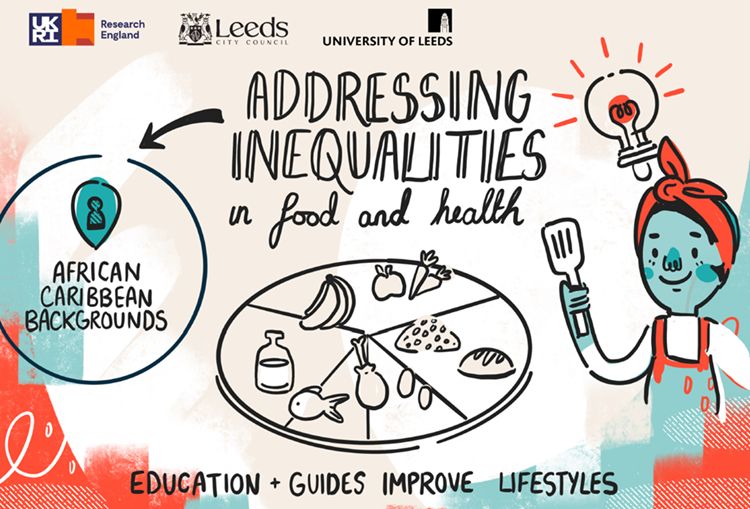A research project to address health inequalities in Leeds

Nutrition advice typically isn’t tailored to specific ethnic groups, who each have different traditional diets and recipes. Our researchers seek to improve their health outcomes.
So far, the team of researchers have focused their work with the African Caribbean community in Leeds. They worked alongside a third-sector organisation and community members to see if tailored (culturally appropriate) food and nutrition workshops could effectively support the community’s diet and health outcomes.
They worked with Feel Good Factor Leeds, which supports local communities’ health and wellbeing through activities, projects and services, in particular for the most vulnerable or disadvantaged.
Read more about 'Addressing health inequalities in Leeds' on the project page.
Healthier African Caribbean recipes
Since 2020, Dr Sally Moore (School of Food Science and Nutrition) has worked with Dr Tanefa Apekey (University of Sheffield) to address the health inequalities between ethnic groups through culturally appropriate healthier eating interventions, including recipes and cooking sessions.
They found that there was a lack of culturally appropriate resources for healthy eating and food choices for certain ethnic groups.
With community members from an African Caribbean background and students from the University of Leeds, the researchers prepared African Caribbean recipes in a healthier way. For example, they added less salt, lower-fat products and more vegetables. Members of the community tested the recipes and found them acceptable.
The final recipes are published on Foodwise Leeds’ recipe hub. They shared the recipes with the public at a well-attended Community Healthy Eating event, funded by Heart Research UK in October 2022.
The researchers published a paper titled “Co-developing multicultural recipe resources: an academic - third sector partnership approach” which details their process and outcomes.
Healthy eating intervention
Following on from their initial research, the team tested the feasibility of nutrition and cooking workshops with more participants of an African Caribbean background in Leeds.
They used the recipes alongside other healthy eating resources provided by Leeds City Council (ie the African and Caribbean Eat Well Guide) within the community organisation, to evaluate whether these are feasible for participants and staff.
For this project, Dr Sally Moore, Dr Tanefa Apekey, Narinder Panesar (Feel Good Factor) and Esther Bissell (Communities and Partnerships Officer, University of Leeds) were joined by Research Officer Aashna Kundra and Dr Peter Ho.
They delivered multiple cooking workshops with the aim to promote knowledge, skills and behaviours and empower the community members to make changes to how they cook and eat.
The feasibility study was funded by Research England, Policy Support Funding (Leeds City Council) and reported at the associated event at the University of Leeds in July 2023.
Knowledge and confidence increased
Following up after the workshop, the team gathered feedback from the participants and staff.
Attendees appreciated the sessions and said that they learned new cooking methods that would allow them to keep enjoying traditional meals. Many said that they would share and cook the new recipes for friends and family.
They reported high levels of confidence in using healthier recipes in their day-to-day lives. Staff at the workshops suggested ways that the resources could be embedded into practice, group sessions and 121 support in the future.
“This research project really supported the community to look at healthy eating and for participants to share their experiences, as it’s not always easy to change habits when they’re used to using certain ingredients and don’t have the knowledge about healthy eating habits and ingredients they could use as an alternative,” said Narinder Panesar, Project Manager at Feel Good Factor Leeds.
“Participants said they really found the session useful and had definitely increased their knowledge about healthy eating and substitutes they could use.
“A few reported were really surprised by the daily allowance of food, this really gave them an insight into how much sugar and fats are recommended for daily allowance.”
Overall, the workshops suggest that this kind of intervention is feasible in a community setting and that it may help increase awareness and use of culturally appropriate healthy eating guidance.
Sharing the results
The research team shared the modified recipes with wider communities and Nutrition and Health Practitioners in Leeds and the UK.
They presented their research at the Nutrition Society Conference in July 2023 and in a paper, titled ‘Feasibility of a Community Healthy Eating and Cooking Intervention Featuring Traditional African Caribbean Foods from Participant and Staff Perspectives.’
The project has been nominated for a British Nutrition Foundation Community Award and it is now being shared with Diabetes UK at learning events.




